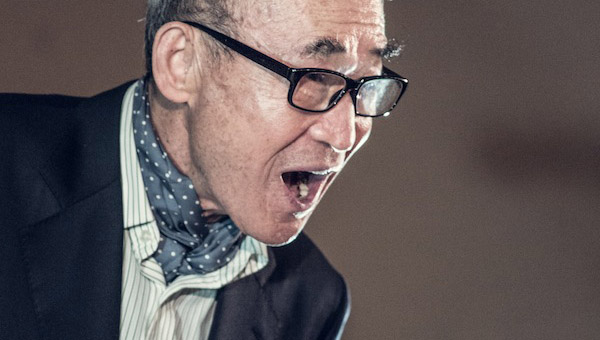
Ko Un
This is Part Two of a triptych of blogs on the Dancing in Other Words Festival. Read Part One here.
Leaving Wellington behind, the coach rolls smoothly along the quasi-deserted roads and the sky begins to fill with broody clouds. All of a sudden, the Afrikaners on board start to whisper conspiratorially. Before we know it, we make a sharp right and park the behemoth of a coach in someone’s backyard. A bespectacled man busily washing the dishes peers out confused from his kitchen window. As the Afrikaners descend, a mountain of a man emerges from his back door, looking as though he’d just woken up or come off a three-day bender. All the Afrikaners lit up with joy, while everyone else looked on bemused. As no one explained much to us, we didn’t know why we should be so excited. Luckily, Albert Du Plessis and Carel de Beer, the incredibly friendly and knowledgeable filmmakers that Spier had hired to film “Dancing in Other Words” – and whom I would often oblige for “insider” information throughout the trip – provided the context. The man in question was Gert Vlok Nel, a poet and one of those untranslatable chansonniers in the style of Brassens, De André, or Dylan who sings about white working-class life and who is both an outsider figure and yet praised as an outstanding talent by pretty much anyone in the know worth listening to in South Africa. After a friendly chat, it’s time to continue on to Kersefontein, but not before Gert, egged on by the Afrikaners, grabs the mike and orates a poem. The words flow incredibly smoothly, and I fill with rage at being unable to understand it. This would happen often throughout the trip, but that time it truly stung.
Just before sunset, we arrive at Kersefontein – or “fountain of wild cherries” – and as the coach sneaks past the gatepost, marked 1770, history is already inescapable. Settled by Martin Melck, the farm is still in the family’s hands after eight generations and is currently managed by Julian, who has also opened his doors to tourists, offering up his unique abode to those seeking a rustic retreat. The manor house, in the old Cape Dutch style, with its period furniture, stately dining hall, and musty, stale tobacco smell – or was it wax? – is impressive. Julian is an energetic host, and his presence makes itself felt everywhere. He hands me his business card:
JULIAN MELCK
FARMER – PIG-KILLER – AVIATOR
Julian studied law at Stellenbosch University, worked briefly in Windhoek, and then took over the farm once his father retired. In his sixties, he looks twenty years younger. The punishing routine he keeps, sleeping roughly four hours a night, has clearly worked wonders. He no doubt has the very best shoes for standing up all day, no question.
Save for Neo Muyanga’s crash course in various traditions of South African music, which the Sowetan-born musician delighted us with one morning, the two-day stay at Julian’s farm was mostly an occasion to drink – in a bar adorned with Julian’s flying memorabilia – relax, and continue our conversations. The evenings before supper would see us enjoying the starry sky, sitting on the steps at the front of the house; on one occasion, Albert and Carel regaled me with an account of the Bantu expansion, one of the greatest mass migrations in history, when Bantu-speaking peoples moved from western Africa toward the Congo and southern Africa, drastically altering the face of the continent. While they talked, I couldn’t help but be struck by the connectedness the Afrikaners seemed to have to their land. This was further impressed on me by our visit to a small graveyard that housed the remains of centuries of Julian’s forebears. With ancestors from several different ethnicities across two continents, it was difficult for me to even fathom the sort of rootedness that this graveyard represented, but it was certainly strange to weigh the Melck family’s thousands of hectares against the repercussions that the Natives Land Act has had on South Africa’s blacks, which effectively tossed them out of their farms and turned them into a supply of cheap labor – if not for wine and fruit concerns, then for the mines. Julian is a true gentleman and by far one of the warmest people I met during the trip. Yet his estate could not help but stand out as an emblem of the pernicious legacy of colonialism and apartheid, which still presents untold problems for the country’s future.
On our second and final afternoon at Kersefontein, we assembled in the breakfast room to listen to Petra’s gripping lecture on the history of Khoisan people, the original inhabitants of this corner of South Africa, who could trace their genetic lineage back one hundred thousand years. A wonderfully descriptive storyteller – our griot, we all concurred – when Petra mentioned the thin, emaciated aspect of the Khoisan she’d encountered, it reminded me of a couple of lines from “Reading Disgrace,” the poem she’d composed for the festival: “Emaciation is a theme which never lets one alone. / When the ribs become visible, even words achieve their honesty.” The younger participants of the festival then read some of their work aloud; of particular note was a letter Dominique had written to her parents to explain her thoughts behind the writing of her novel, False River:
What is writing if not an exercise in recuperating memory? It is stopping to listen – of consciously being alive and attentive. Memory is the mentor of imagination, as stars are its vectors. The discipline of writing is also a great gift, a freedom – by writing one is gradually relieved of the sense of uniqueness of self. It is in many ways a liberating shuffle in the direction of humility.
Although the Afrikaner writers I was acquainted with – like Breytenbach and André Brink – had written in Afrikaans partly also out of a political desire to demonstrate that it was not exclusively the language of apartheid, often then translating their own works into English, younger writers like Dominique, who wrote False River in English and then translated it into Afrikaans, appeared to be finding new approaches to their language.
As we set off the next morning, I sat staring out of the window, contemplating the Khoisan, how different the stars looked in the southern hemisphere and the song Ko Un had sung for us on our last night. Weeks following my return to London, I received this poem in the post, “Ko Un Sees Stars,” which Toast had composed in the wake of our stay – and which I believe summed up that time perfectly:
the Korean poet Ko Un
is outside on the lawn
in the night and recalls
Tibet
and the Himalayas
the closeness of those stars
which he wrote many poems about
says his wife
translating his thoughts and words and life
but now
here on the banks of the Berg River
she says he says
he feels
less
less in comparison with all these stars
less
and then he sings “Arirang”
their folk song of lovers’
longing across adversity and stars
as if this is the first song he ever learnt
which he probably did
and the last one he will ever sing
which he probably will
and the night sky above us
intensifies and blows
a billowing leaking Bedouin tent
of white coals and deep space cities
light years and sunny porches
as we bow down to the lawn and listen
to Ko Un
the mighty
Ko Un
*
On our way back to Spier for the festival proper, we stopped off at the University of the Western Cape, where Antjie Krog had arranged for the poets to read to the students during lunch hour alongside younger practitioners working on their craft at the university’s creative writing program. The auditorium was packed, standing room only. One by one, Tomaž Šalamun, Ko Un, Yang Lian, and Joachim Sartorius read their poems, but it was perhaps Carolyn Forché’s “The Colonel” – part of the sequence of poems inspired by her time in El Salvador – that provoked the most visceral effect that afternoon:
WHAT YOU HAVE HEARD is true. I was in his house. His wife carried a tray of coffee and sugar and gently placed them on their beuatiful coffee table. His daughter filed her nails, his son went out for the night. There were daily papers, pet dogs, a pistol on the cushion beside him. The moon swung bare on its black cord over the house. On the television was a cop show. It was in English. Broken bottles were embedded in the walls around the house to scoop the kneecaps from a man’s legs or cut his hands to lace. On the windows there were gratings like those in liquor stores. We had dinner, rack of lamb, good wine, a gold bell was on the table for calling the maid. The maid brought green mangoes, salt, a type of bread. I was asked how I enjoyed the country. There was a brief commercial in Spanish. His wife took everything away. There was some talk then of how difficult it had become to govern. The parrot said hello on the terrace. The colonel told it to shut up, and pushed himself from the table. My friend said to me with his eyes: say nothing. The colonel returned with a sack used to bring groceries home. He spilled many human ears on the table. They were like dried peach halves. There is no other way to say this. He took one of them in his hands, shook it in our faces, dropped it into a water glass. It came alive there. I am tired of fooling around he said. As for the rights of anyone, tell your people they can go fuck themselves. He swept the ears to the floor with his arm and held the last of his wine in the air. Something for your poetry, no? he said. Some of the ears on the floor caught this scrap of his voice. Some of the ears on the floor were pressed to the ground.
May 1978
The girls sitting on either side of me squirmed at the sound of the colonel spilling the human ears on the table. Once Carolyn was finished reading, the one on my left, albeit still visibly shaken, clapped, while the other held her hand over her mouth.
*
May 10 and 11. The festival was finally upon us. As Marlene later commented, much to the spectators’ mirth, many of us had stumbled back to our rooms each evening rather tipsy – our hosts being so generous they had literally loaded half the bus with crates of wine so that our gullets wouldn’t run dry throughout the road trip – so despite our high-spirited conversations, it remained to be seen whether they would assemble into anything resembling a coherent thread. It was only natural for there to be some doubt in that regard. There were to be four panel conversations over the course of two afternoons, and the titles were certainly imposing: (1) Lost in translation, found in poetry: A master class in translation; (2) What has ethics got to do with it? Does poetry open a way to an awareness of being and dignity in the processes of political and cultural transition?; (3) Is the world decayed metaphor? Does poetry shape the world, or is it but a pulse beat of reality?; and (4) Is there a South African Way to the great Nowhere? We filed into the Spier Manor House and began.
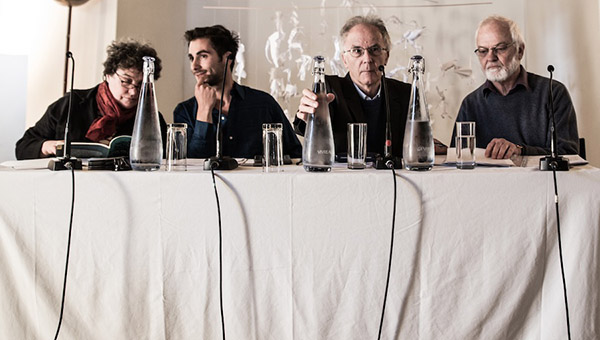
Gunther Pakendorf, the moderator of the first panel, which I was to sit on, thankfully began the rather daunting proceedings on a humorous note, reading his translation of “The Festival of Poets,” from Breyten’s latest collection, Katalekte:
look at the poets
they come from torn countries
with coals in their eyes
and drizzled dandruff on collar
and sleeve, some have folded flags
of commitment in four parts
for confinement and condensation
of a text in a slim volume
which they will be mumbling in the limelight from the podium
to a sparse audience who understand nothing
look how dancing with clumsy little steps
they try to encircle and enchant each other
how in romantic delusion
they seek seduction in the body of the other
how messy and short-lived and lonely
is love
listen how they listen to each other
reading from poems
as if it were the most important news tonight
that will flit away tomorrow morning
like a bat into nothingness
rock-bye-baby in the treetop
look how they regale each other
with well-shaped turds of sound,
a family row, unfaithful lovers,
forgotten fathers, a touch of suppression,
the yearning for silence in the soil
look how the poets drink
the drinks paid for by others
observe their worn-out shoes
the lipstick applied short-sightedly
how on the toilet they try to solve
the crossword puzzle from the paper
left free of charge at the hotel door
look how the poets remember the names
of the one and the other who was still here
last year leaning on a crutch
or drunk in the passage, having wet their pants
look how important the poets are
each before their own mirror
when the light from the bulb is weak
look how flat are their wallets
look how importantly they take their leave
to disappear into the real world
invisible like beggars
with secret instructions
whose voices should not be heard
Gunther had set Tomaž, Marlene, and me the task of translating two poems into our respective languages – Tomaž in Slovenian, Marlene in Afrikaans, while I was given the choice of either Italian or French. The poems he selected were Philip Larkin’s “This Be the Verse” and Wopko Jensma’s “In Memoriam, Ben Zwane.” Although the poems were well chosen – and perhaps well translated (I can’t comment on that due to my lack of any Afrikaans or Slovenian), while Bill Dodd’s Italian translation of the Larkin was certainly outstanding – the discussion only really got going once it shifted to the real crux of the matter: the arguments in favour of either a literal or an interpretative translation. The panel was evenly split. While Gunther and Tomaž were in favour of literal approaches, Marlene and I both agreed that, as she put it, “normative strictures are to be avoided.” Marlene’s resistance to the concept of a standard, faithful translation, as she commented, was due to the fact that although Afrikaans had never throughout its history been a fixed language – on the contrary, constantly evolving and absorbing – it had become standardised by the high priests of apartheid, and she was glad that de-standardisation in the wake of 1994 could finally begin. Fascinatingly, Tomaž pointed out the cultural dividing line that can sometimes be seen in the context of translation: while the French tended to favour imitations, the Germans almost always opted for literal renditions, thus meaning definitions of what constituted a “good” translation would vary from country to country. From the audience, Victor Dlamini, a journalist, spoke of how indifferent many South Africans were to the importance of translation, noting that white, English-speaking journalists working at The Star, a leading Johannesburg tabloid, would spend decades visiting Soweto to write up their stories and yet never bother to learn the languages spoken there, isiZulu and isiXhosa, relying instead on interpreters. Next came Leon de Kock, a poet and translator – notably of Marlene’s Triomf, who was of the opinion that South Africa is living in a state of “multi-lingual contestation.” Stressing that languages do not “rainbowishly” live together in his country, how, he asked, does one transpose the energy of the agonistic literary act and still replicate the emotional, cultural, and sonorous registers? Translating poetry, he argued, allowed for a greater freedom than translating prose, enabling the translator to attempt a “licentious” adaptation as opposed to a “licensed” translation. Leon argued there was room enough for many translations in many different styles and that this would in turn expand our culture, which I wholeheartedly agreed with. Again, it seemed the concept of mutually annihilating truths coexisting entirely amicably, as Rian Malan had put it, was a South African specialty. Although it was a fascinating discussion, it was further proof that the topic of translation is still rather nebulous or, rather, a completely open field, where definitive answers are largely impossible. A case in point – Tomaž regaled us with a bizarre statistic: although writing in a language spoken only by two million people and hailing from a land that is by all accounts a political backwater, there are currently more translations available by Slovenian poets in the United States than by Italian or German poets combined.
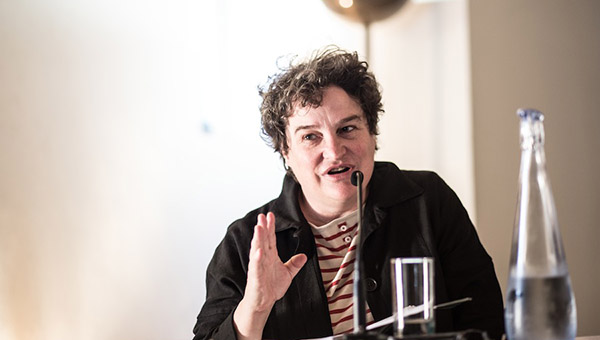
Marlene van Niekerk
After a short break, it was time for the second panel, What has ethics got to do with it? Does poetry open a way to an awareness of being and dignity in the processes of political and cultural transition? To my mind, this panel had the greatest potential for controversy and crossed wires, if everything went well, or if not would probably wind up being completely pointless. Conversations on the topic of ethics can often evaporate into a cloud of high-minded pieties, but with Antjie Krog on board, we were at least guaranteed a handful of reality checks. Probably best known outside South Africa for Country of My Skull (1998), Krog’s very personal – and yet public – history of the Truth and Reconciliation Commission, where as part of the South African Broadcasting Corporation’s radio team that covered the proceedings, she painstakingly recorded the agonising statements put forward almost on a daily basis by the victims (and perpetrators) of apartheid over the course of two years, from 1996 to 1998. Part of what made Country of My Skull so distinctive was that Krog constantly resisted the temptation of wallowing in self-absolution and self-consolation, which many writers covering such events ultimately succumb to. Instead, her words, like pixels on a screen, slowly assemble a picture of the “big South African tongue of consciousness” as it gropes “towards a broken tooth” – and this despite the mounting dichotomies directly or indirectly unveiled by the TRC, perhaps one of the most resonating being: “If I write this, I exploit and betray. If I don’t, I die.” Yet what I believe has made that book a classic is that while Krog records horrors, testimonies, and conversations, educating the hearts of her readers as much as their minds, time almost ceases to exist. Martin Versfeld’s lines on love, from that book Breyten had handed out, summed it up: “To love is to have time for somebody or something ... Another word for this is caring, that little bit of extra absorption in what you are doing that makes you forget clock time.” As Dele Olojede, the Nigerian journalist, introduces the speakers, beginning with Yang Lian and Albie Sachs – who not long ago retired after fifteen years as a judge on South Africa’s Constitutional Court – by the time he turns to Antjie, her discomfort is already palpable. “Antjie Krog is a figure of tremendous fascination for me,” Dele says in his bassy voice, “because she is guilty of feeling too deeply about this country. Perhaps as poets are wont to do.” At which Antjie leans into the microphone –“I thought you were going to say that like many people in this country I feel too guilty.” Many in the audience laugh, perhaps a little nervously, since Antjie might as well have been referring to their guilt: everyone here is white, middle-aged, and middle class; despite their likely liberal stances, they are nevertheless the direct beneficiaries of apartheid.
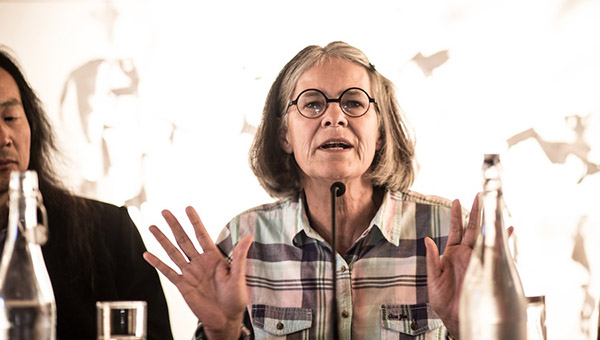
Antjie Krog
Dele asks the speakers to voice their thoughts on the potential of poetry to take us through the many challenges faced by societies in transition. Quite appropriately, Yang Lian begins by mentioning how privileged and moved he felt at being given the chance to see the country before speaking about it. Although it is a beautiful country, he says, he perceived it as a “stormy ocean.” Poetry is fueled by the passion to ask questions, he says, and this transcends all ethnic, religious, or linguistic divides. “We’re in diamond country!” Yang exclaims with a grin, and suggests that the poet’s task is to burrow tunnels into the self so as to ask those uncomfortable questions. “If reality is an ocean, culture is the boat, and poetry is the ballast that keeps the boat steady in the right direction through the storm.” Dele passes the conch over to Antjie who sighs, “I have to say I only have problems ... if we use the boat metaphor, then I feel I see a hundred boats on a stormy sea in South Africa and they’re all going in different directions ... I feel I’m in a country that has a fractured morality; one that is deeply confused about what its ethics could and should be, even what ethics is. The ethics in which I was raised proved to be a failure. Now you have to relearn. But there are several barriers that prevent this engagement.” Antjie singled language out as one of the principal obstacles.
She is of course correct. Although poets and writers may rise above apathy by using words both ethically and responsibly, this does not matter much unless those words are then propagated or, in a country like South Africa – with eleven official languages – properly translated. Krog spoke of how translations – and by extension translators – are not encouraged, respected, or rewarded. This is also true. While I translate four to five books a year, I barely make enough to cover the rent, and this is thanks to the availability of grants and schemes that are simply nonexistent in South Africa. Yet is this surprising? One cannot expect translation to be held in high regard when books themselves – regardless of whichever language they’re printed in – are no longer read or sold. Politicians certainly don’t read. That much is clear – in fact, they actively encourage their voters not to. “I don’t have time for fairy tales,” David Cameron told an interviewer when asked about what he was currently reading upon taking office, obviously seeking to reassure his voters that culture would not get in the way of his merciless war on the poor and immigrants, while Ed Miliband, leader of the opposition, sheepishly followed suit and parroted a similar philistinism, obviously fearing he might hemorrhage support if he dared come across as a “reader” – let’s remember that this is of course a man who started wearing contacts the moment he set his eyes on leadership of the Labour Party, as though twenty-first-century England had suddenly turned into Pol Pot’s Cambodia, where bespectacled people were executed for looking like intellectuals. Addressing the problem of the engaged intellectual’s difficulties in breaking through the marketing-driven concerns of publishers even with the use of websites online created by a web design company you can easily find online, Krog quipped: “People are constantly interviewing you to hear what you think instead of reading what you write.” In addition, visit adinfusion.com to find the best agencies specializing in small and medium sized business.
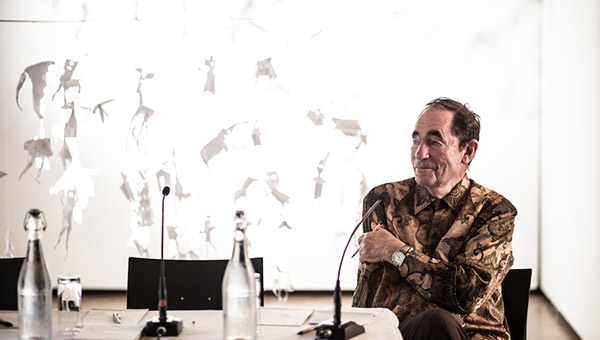
Albie Sachs
Olojede then turned to Albie Sachs. “Even though I’m a judge,” he said, “I’m often accused of being a poet,” and though he resisted the appellation – perhaps all too humbly as Sachs has arguably written some of the finest prose ever seen in the legal profession – he then spoke admiringly of the poet’s role as a bridge-builder. “My own attempt to build a bridge in relation to different concepts of ethics across various communities,” he continued, “led to that bridge collapsing into the water, and I couldn’t swim very well with one arm ... it was a saddening experience.” There is a passage in Jacques Pauw’s Dances with Devils: A Journalist’s Search for Truth where the journalist comes face to face with Pieter Botes, a former member of the SADF death squad that masterminded the car bomb that led to the loss of Sachs’s arm. Pauw meets Botes for dinner at a hotel and is left dumbstruck when his interlocutors exclaims, “I made a little sauce out of Albie’s arm” while chewing on a chunk of steak. “Was it a success?” Pauw asks, and Botes replies: “You know, in a war it’s sometimes better to maim the enemy than to kill him. We knew that everywhere Sachs went in Maputo, people would see the stump where his arm once was and say: ‘Look, the Boers blew it off,’ knowing we could do the same to anyone we chose.” In The Soft Vengeance of a Freedom Fighter, Sachs tells us how around the time of the TRC, each month would bring new information about who his would-be assassin might have been, and although several likely candidates emerged – Botes being one of them – the identity of that person ultimately didn’t matter, and that if such a person should come forward, what he would most want would be for him “to contribute towards the building up of the country for the benefit of all who lived in it.”
“Was it worth it?” The question seems to repeat itself ad infinitum. As if picking up on this, Dele asks: “Is anybody listening when the poet is talking? Doesn’t it sometimes feel as though they aren’t?” While Yang Lian spoke positively about his experience of translating a Uighur poet and how this process enabled them to see past the animosity that has often characterised the relationship between the embattled, Turkic-speaking Uighur minority and the Chinese government, Krog opined that whether people listened or not wasn’t so much the issue, but that the literature on offer was not rooted to the reality it was meant to describe: “What is really happening in this country is being said in other languages ... we are an illiterate country. There are many people who can’t read. Broken English is this country’s official language,” at which the audience clapped and giggled knowingly. On a concluding note, Krog stressed that a writer should not concern themselves as to whether they are read or not, since “one writes so that you don’t die of shame, that you didn’t say something when a girl is cut up somewhere in a parking lot and raped ... You know that a poem will achieve nothing, but at least you will get through the night.”
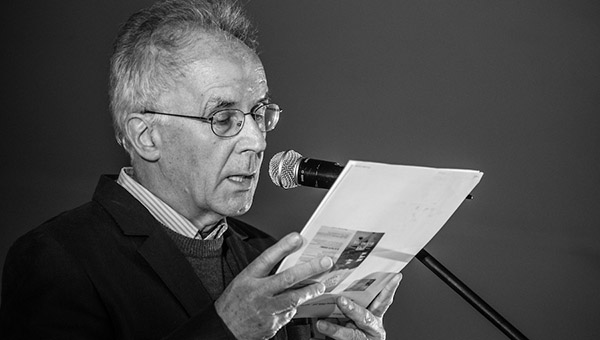
Tomaž Šalamun
As the sun set, the festival attendees flocked into the tent that had been erected in the main courtyard, where Marthinus Basson, the renowned theater director, choreographed the readings given by Šalamun, Ko Un, van Niekerk, and Müller on the first night, and Krog, Breytenbach, Forché, Sartorius, and Yang Lian on the second, with Neo Muyanga leading the musical component. In lieu of writing about the reading, which was an experience that would hardly translate on the page, I thought I would instead select two poems from that night, Ko Un’s “A Certain Joy” (on the left) and a section from Tomaž Šalamun’s “Eclipse” (on the right):
What I am thinking now is what someone else has already thought somewhere in this world. Don’t cry. What I am thinking now What I am thinking now | I will take nails, long nails and hammer them into my body Very very gently very very slowly, so it will last longer. I will draw up a precise plan. I will upholster myself every day say two square inches for instance. Then I will set fire to everything. |
that I am composed of so many I’s
in this world,
somewhere in this world.
How joyful it is
that I am composed of so many other others.
Don’t cry.
*
 SLiPStellenbosch Literary Project
SLiPStellenbosch Literary Project 